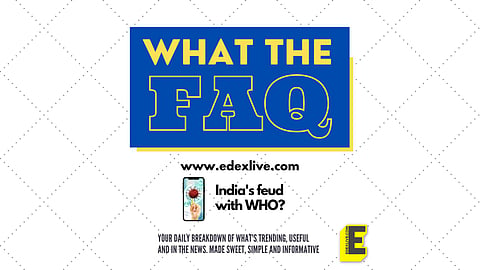

For more than a year, the World Health Organization (WHO) has been researching to estimate the total number of deaths due to the COVID-19 pandemic around the world. It has surfaced on April 16, in a New York Times article that India has stalled the WHO’s efforts to analyse COVID-related data because of which the WHO has been delayed in releasing the death-toll figures. What is this all about? We find out in this edition of What The FAQ.
What is the news?
A team of experts, including demographers, public health specialists, statisticians and data scientists, from the WHO have undertaken an ambitious project, which seeks to calculate the global death toll caused by the COVID pandemic. India has been objecting to this collection and publication of the data for months. After the WHO reported this in a New York Times article, the Indian Ministry of Health and Family Welfare responded with a report on April 17. In a statement, the Ministry said that India has no objection to the data, but to the methodology used by WHO for its collection. "India’s basic objection has not been with the result (whatever they might have been) but rather the methodology adopted for the same,” it stated.
What were the findings of the research?
While the WHO claims that at least four million deaths have occurred in India, as found through the study, Prime Minister Narendra Modi has given the country’s own count of these deaths to be only 520,000. WHO’s estimate in the global scenario also far exceeds the reported estimates. It has claimed that a total of about 15 million deaths have occurred by the end of 2021, which is twice as much as the total deaths reported by individual countries.
Why is India objecting to the methodology?
India has claimed that the WHO used a “one size fits all” approach in making the death estimates. The method, says the Health Ministry, may be fit for small countries like Tunisia, but for a large country like India, with geographical variations, it is not an apt method. India has also put forth objections to the WHO’s study of unauthorised data from 18 Indian states and the same being used for Tier I countries, and to the methodology to calculate the age-sex death distribution for India. The Health Ministry said that India's age-sex distribution of predicted deaths was extrapolated based on the age-sex distribution of deaths reported by Costa Rica, Israel, Paraguay and Tunisia. Due to these reasons, the validity and accuracy of the enterprise were questioned.
Who else is objecting?
Other Member States of the WHO like China, Russia, Iran, Bangladesh, Syria, Ethiopia and Egypt have also raised their concerns regarding the methodology used by it. But India has been the only country to attempt to stall the publication of the findings.
What is the WHO’s reaction?
WHO is displeased about the delay caused in being able to publish the findings of the study. It said that the delay was significant because the global data was essential to analyse how the pandemic has panned out and what steps can be taken to mitigate a similar crisis in the future. Some member countries have also warned that if the WHO officially did not release the data soon, the experts would do it themselves.
WHO was supposed to publish the findings in January, but it wanted to consult all its member countries first before the publication. India has been objecting to it since, and the effort to publish the data by WHO in February did not come off fruitful. However, a WHO spokeswoman, Amna Smailbegovic, said that they aimed to publish in April.
What’s next for India and the WHO?
India said that it would keep an open mind and was ready to collaborate with the WHO, given the WHO’s transparency regarding the process. “India has asserted that if the model is accurate and reliable, it should be authenticated by running it for all Tier I countries and the result of such an exercise may be shared with all Member States," the Ministry of Health said. The Ministry also said that talks on this matter would be carried out with the WHO.
